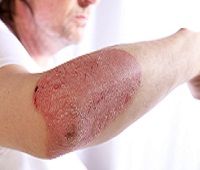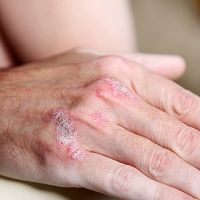What We Learned About Psoriasis in 2015
Between tip-top researchers exploring new treatments and conference coverage dedicated to the cause, psoriasis did not take a backseat this year.

Between tip-top researchers exploring new treatments and conference coverage dedicated to the cause, psoriasis did not take a backseat this year.
Patients with psoriasis experience thick red patches and silvery scales on the skin; and although not contagious, the condition can be uncomfortable and even downright painful. There are five types of psoriasis, plaque being the most common, as well as guttate, inverse, pustular, and erythrodermic. About 10% to 20% of patients with plaque psoriasis develop psoriatic arthritis, according to the Centers for Disease Control and Prevention (CDC). There are no cures for these conditions, but strides made over the past 12 months have certainly moved the effort in the right direction.
Read on to catch up on the key psoriasis findings in 2015, and stay up-to-date with the MD Magazine plaque psoriasis condition center.
Â

Understanding the difference between clear and almost clear skin is crucial with the advent of new biologic therapies make complete clearance attainable. The research was presented at the American Academy of Dermatology 2015 Annual Meeting (AAD 2015) in San Francisco, California.
Â

Joel Gelfand, MD, MSCE, FAAD, from the University of Pennsylvania, discussed the growing medications and treatments for patients with plaque psoriasis at AAD 2015 in San Francisco, California.
Â

Treating moderate to severe plaque psoriasis is certainly no picnic for patients’ pockets.
Â

A Dutch study in Clinical Kidney Journal suggests that a treatment for psoriasis and multiple sclerosis may induce a dangerous adverse effect, particularly in women.
Â

Researchers found that adding kunzea oil to topical psoriasis treatments with liquor carbonis detergens (LCD) and salicylic acid did not improve the irritating skin condition.
Â

It’s generally well-understood that smoking cigarettes exacerbates symptoms of psoriasis. But a study in the Polish population, published in Postepy, clarifies and strengthens the link between smoking and the development of psoriatic lesions.
Â

The healthcare technology company Philips has launched BlueControl 2.0, a device created to treat patients afflicted with psoriasis.
Â

Individuals afflicted with psoriasis and psoriatic arthritis are also at higher risk for new-onset migraines.
Â

A German cohort study in Archives of Dermatological Research found that antipsoriatic drugs for treatment of moderate-to-severe psoriasis are generally safe over the long-term.
Â

Skin disease often improves after surgery, but no one usually knows why.
Â

Psoriasis patients are susceptible to artery inflammation, increasing their risk for cardiovascular disease.
Â

Treatments for moderate-to-severe plaque psoriasis are plentiful, for sure; they run the gamut from topical therapy to phototherapy to biologics.
Â

Results from a novel phase 3 study show treatment with adalimumab (Humira/AbbVie) produces favorable outcomes in young patients with plaque psoriasis.
Â

Although psoriatic arthritis only targets those diagnosed with psoriasis, a genetic factor has been discovered that only pinpoints the former.
Â

Does the use of topical corticosteroids in combination with etanercept treatment improve outcomes compared to etanercept treatment alone in patients with plaque psoriasis? Or, failing that, can the addition of a topical corticosteroid agent to the treatment regimen produce similar results at lower doses of etanercept?